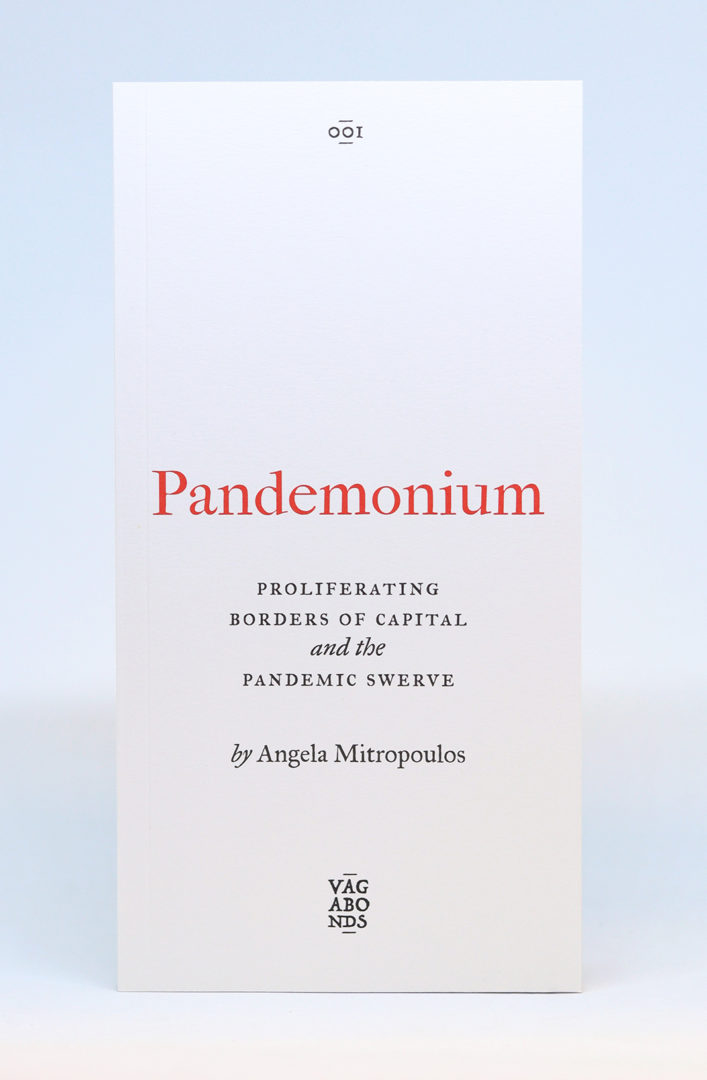Municipal workers in full protective gear. Bangkok, Thailand. March, 2020. Photo: feelphoto / Shutterstock.com
Pandemic pandemonium and the deadly privatization of risk
- July 25, 2020
Capitalism & Crisis
Angela Mitropoulos’s new book Pandemonium unpacks the deadly structures of power behind the pandemic that changed the world.
- Authors
In November 2019, a new strain of coronavirus appeared in Wuhan, China, and quickly spread across the world. Since then, the pandemic has exposed the brutal limits of care and health under capitalism.
Angela Mitropoulos’s Pandemonium, part of the new VAGABONDS series published by Pluto and edited by Max Haiven, underscores the turning-points between neoliberalism and authoritarian government, crystallized by ineffective responses to the pandemic. In doing so, it questions capitalist understandings of order and disorder, of health and disease, and the new world borders which proliferate through distinctly capitalist definitions of risk and uncertainty.
From the origins of the crisis at the crossroads of fossil-fueled pollution and the privatization of healthcare in China, Mitropoulos follows the virus’ spread as governments embraced reckless strategies of “containment” and “herd immunity.” Exoticist explanations of the pandemic and the recourse to quarantines and travel bans racialized the disease, while the reluctance to expand healthcare capacity displaced the risk onto private households and private wealth.
VAGABONDS: In this pamphlet you call to task not only the authoritarian and reactionary responses to the pandemic — which have led to the premature deaths of so many people, especially racialized and other people made already made vulnerable by their policies — but the liberal and would-be progressive responses as well.
Both approaches, you argue, share a foundation in what you call oikonomia, or “the law of the household.” This foundation licenses the violent expulsion of outsiders, forms of population management and discipline. This, you argue, helps us understand the way racism and capitalist accumulation have characterized the response in a variety of places. Can you unpack this a bit?
Angela Mitropoulos: The core argument of Pandemonium is that ineffective, or seemingly incompetent responses to the pandemic involve a substitution that makes them appear plausible, even as they result in hundreds of thousands of preventable deaths. That substitution, put simply, is that they conflate disease and social disorder — or what is imagined as social disorder. Their goal, then, is to restore that presumed social order.
The most extreme version of this metaphorization of disease is the fascist obsession with “degeneracy” and “renewal,” with the treatment of “foreigners” as “germs,” which involves both an eliminationist, therapeutic eugenics and, at the same time, the “restoration” of ethnonationalism.
As for the difference between conservative and progressive approaches to the pandemic, I do not think these represent distinct and irreconcilable political camps. That does not mean they are the same. It means that I approach these in terms of their economic and legal meaning and implications — or, oikonomia, which means norm or “law of the household,” and is the etymological root of both “economics” and “ecology.”
Within the history of economics and law, authoritarianism represents the elimination of property rights or their absolute transfer; whereas liberalism implies the preservation of individual property rights. This is because they were both modeled on the property rights of the master of the plantation and agrarian estate — the presumably ideal household.
They do not point, then, to a distinction between a collective and individualist accounts of rights, as many assume. They are a divergence over the scope and content of public and private law. But, more importantly and from the perspective of those whose subordination is assumed in both cases, the difference represents the contested threshold of surplus value.
The corresponding responses to the pandemic are the authoritarian suspension of rights over one’s own body (as in the quarantine or militarized cordon sanitaire), and the liberal privatization of risk. In reality, these measures coexist, are applied unevenly, materialize the distinctions of class, race and gender, give rise to borders. In practice, the privatization of risk means that life chances are determined by assets and inherited wealth, while the quarantine exacerbates the spread of infections within congregated spaces.
Pandemonium takes pains to show us that the technique of quarantining is not only largely ineffective at preventing the spread of the pandemic, but is rooted in a long history of racism and colonialism. You also show how it is linked to the idea of “herd immunity” and part of a neoliberal habit of privatizing risk by transferring dangers onto private households. Since the book went to press in early June, has this been confirmed?
I would much prefer to have been wrong. As for the details, there are far too many illustrations of why neither quarantines nor the privatization of risk are effective responses to the pandemic. The largest clusters of infection have been quarantined cruise ships, prisons, assisted living facilities.
While a great deal of confusion has been fostered over what a quarantine is, it is a technique of separation and confinement that, because it congregates people who are suspected of having been exposed to an infection, exacerbates the spread of infections among people so confined. It is not the same as medical isolation of those who have tested positive or physical distancing — as with the absence of testing and physical distancing on quarantined cruise ships.
The privatization of risk makes inherited wealth into a determinant of health. The priority accorded to quarantines, travel bans, the distorted idea of “herd immunity” and the privatization of risk — over and above encouraging relatively-low cost and effective measures such as masks and physical distancing, or widespread testing — is tantamount to the facilitation of mass murder. Pandemonium explains the history of quarantines and “herd immunity” in detail because anything less would be both reckless and intellectually lazy when there are lives at stake.
The question that initially struck me in February is why, after almost a century of being relegated to the colonial margins — the quarantine had returned as a central response to this pandemic. When we knew that the quarantine is ineffective. Foucault’s claim that the quarantine disappears along with the eclipse of territorial sovereignty is wrong because, as it turns out, neoliberalism involved both the privatization of risk and the proliferation of borders. As for the distorted idea of “herd immunity,” it is an amalgam of Nietzschean fascism, Malthusian conservatism and neoliberalism.
This is why it is important to rethink the distinction between authoritarian government and economic liberalism as a threshold within economics and not as rival political tendencies. There are always turning-points between the two approaches, and which approach is used depends largely on whether it has been used against certain groups of people before.
Do you share the optimism of some that this pandemic will open the horizon to systemic change? You write in Pandemonium about the tremendous and world-historical shift that came of the Bubonic plague in the late middle ages, both for good and for ill. Do you think this pandemic has the capacity for similar disruption? And will, on the balance, that disruption be good for those who care about justice, equality and so on?
I think this is a pivotal historical moment in which everything is intensified, yes. And I do mean everything. But while I discuss, for instance, the difference between Adam Smith’s optimism and Malthusian pessimism, I am not myself given to either. Fatalism is an impediment to change, however implicit.
I find it impossible not to wince at the idea of optimism in this moment. The suggestion that things will become better because they are worse strikes me as a profoundly reckless, a delusion of grandeur that looks for validation in other people’s sacrifices. Mourning the dead and fighting for the living is a better guide — particularly when there are so many dead and there is so much to fight for.
As for writing, I am more interested in the work of reconnaissance, or discerning the dangers ahead and the obstacles to movement and change. I see that work as a contribution to ensuring things turn out better than they otherwise might. Whether things, and which of those things, turn out for the better requires clarity; not some nebulous optimism or pessimism with which to rally emotional and speculative investments.
What do you make of left-wing responses to this pandemic from various corners? I’m thinking here specifically about your critique in the book towards the economic nationalism of some parts of the left, notably the trade union movement, but also those who hope for a return of the welfare state in the wake of the increasingly transparent failings of neoliberalism. Conversely, what do you make of the kinds of mutual aid platforms of the extraparliamentary left?
As I mentioned, I am interested in doing the work of reconnaissance. So, in that respect, I conclude with a discussion on corporatist unionism, and what this means for reckoning post-pandemic debts, particularly in light of the fact that the infrastructure which sustained locked-down households was predominantly undertaken by Black and brown people, many of which are migrants. It is shameful that certain unions did not fully support the inclusion of migrants in the expansion of welfare payments and healthcare, where those were extended.
It will be worse if, in this moment, nostalgia for the racial and gendered welfare state of Roosevelt’s New Deal furnishes the model put forward for some post-pandemic “social contract.” Mutual aid has proven to be crucial, particularly given the increasing determination of welfare and healthcare by inherited household wealth.
Indeed, it has been mutual aid efforts that have prioritized information about masks, hand washing, of the difference between physical and social distancing, in ways that governments have not. I should add that the convergence between abolitionism and mutual aid is also important, in that it gives meaning to the difference between the economics of care and the economics of policing.
This book arrives early in what promises to be quite a number of radical theorizations of the pandemic, but not before some of the luminaries of “critical theory” weighed in, often rather hastily. Can you give us a sense of how you approach differs from that of some of these figures?
I have written about Giorgio Agamben’s and Jean-Luc Nancy’s responses to the pandemic elsewhere — the gist of which is that they rehearse rival positions within economic liberalism, and in that sense, that both tended to treat private property or private law as if it were natural. And I have to admit, that I found their responses remarkable for doing so, was surprised that they took the positions that they did, and had to rethink a little what I had read of their past writings, for which I have a great deal of respect. But ultimately, the concept of biopolitics and Heideggerian deconstruction seem to assume a perspective on oikonomia that I cannot.
Pandemonium by Angela Mitropoulos is out now from Pluto Press.
For more info about VAGABONDS check the website.
Source URL — https://roarmag.org/essays/pandemic-pandemonium-and-the-deadly-privatization-of-risk/



